Thinking about a fresh start and Living in Madeira Portugal? Living in Madeira could be the adventure you’ve been waiting for.
Madeira island consists of breathtaking landscapes, a rich cultural heritage, and a welcoming community. For expats, living in Madeira, life here means embracing a relaxed lifestyle while enjoying modern amenities and outdoor activities.
So, whether you’re drawn by the climate or the local culture, this guide will look into what you can expect from living in Madeira, Portugal, and how to move here.
The Island of Madeira, Portugal
Known for its stunning landscapes, lush greenery, and year-round pleasant climate, Madeira, Portugal, offers a unique lifestyle that attracts both locals and expats.
Madeira island is an archipelago which is located about 1000 km off the coast of North Atlantic Ocean. It is also known as the “Pearl of the Atlantic” due to its scenery and rich natural beauty.
For those considering living in Madeira, Portugal, the island provides a stunning backdrop, a welcoming community, and a slower pace of life. The beautiful islands of Madeira will play host to the 11th annual World Golf Awards from November 21 to 22, 2024.
Those living in Madeira, Portugal, can easily access these beautiful courses, enjoying leisure and social opportunities against the island’s stunning scenery.
Moreover, the island is also known for its delicious cuisine, which features fresh seafood, tropical fruits, and the famous Madeira wine. Expats often find that living in Madeira, Portugal, allows them to immerse themselves in a unique culture while enjoying the warm hospitality of the locals.
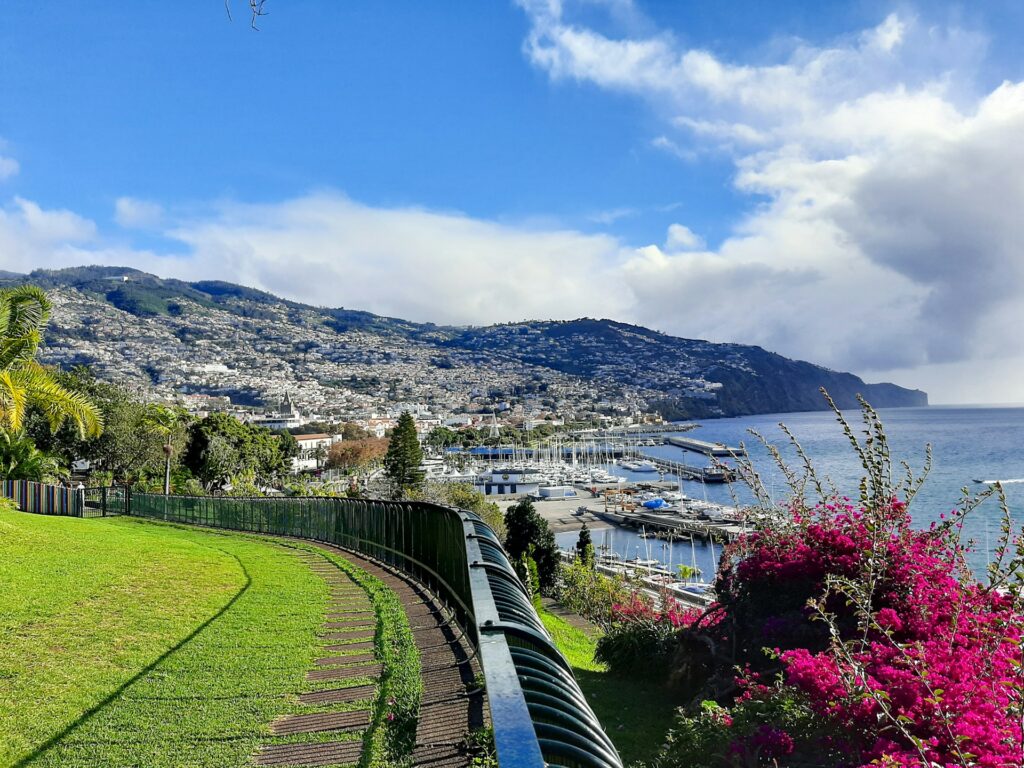
Best Areas to Live in Madeira for Expats
Choosing the right location is crucial when considering living in Madeira Island, Portugal. The island offers a variety of regions, each with its unique charm, amenities, and community feel. Here’s an in-depth look at some of the best areas to live in Madeira Island, Portugal, for expats:
Funchal
Funchal, the capital of Madeira Island, Portugal, is the most popular choice for many expats. This vibrant city is a perfect blend of urban living and natural beauty.
Living in Funchal means being at the heart of Madeira Island, Portugal’s cultural scene. The city hosts numerous festivals and museums and is home to the famous Madeira Botanical Garden.
Funchal offers many amenities, including shopping centres, restaurants, and healthcare facilities, making it convenient for expats living on Madeira Island, Portugal. The availability of international cuisine and local delicacies enhances the culinary experience.
Despite its urban environment, Funchal is surrounded by stunning landscapes. Expats living in Madeira Island, Portugal, can easily access hiking trails, the coastline, and scenic viewpoints, perfectly balancing city life and nature.
While the cost of living in Madeira Island, Portugal, is relatively affordable, Funchal can be pricier than other areas, particularly in tourist hotspots. However, the availability of services and entertainment often justifies the expense.
Calheta
Calheta is another excellent choice for those living on Madeira Island, Portugal. It is located on the southwestern coast and offers a more tranquil environment than Funchal.
Calheta is famous for its sandy beaches, a rarity in Madeira. This makes it an attractive spot for sunbathers and water sports enthusiasts. The calm waters are perfect for families and those looking to relax by the ocean.
The town has a welcoming atmosphere, making it easy for expats living in Madeira Island, Portugal, to integrate into the local community. Various local events and activities foster social interaction.
The cost of living in Madeira Island, Portugal, tends to be lower in Calheta than in Funchal. Housing options are generally more affordable, making them great for families and retirees seeking a peaceful lifestyle.
Surrounded by beautiful mountains and lush landscapes, Calheta is perfect for outdoor activities such as hiking and mountain biking. Expats living in Madeira Island, Portugal, can enjoy exploring the natural beauty that Madeira is known for.
Ponta do Sol
Ponta do Sol is a charming village on the southern coast of Madeira Island, Portugal. It is known for its picturesque scenery and laid-back lifestyle.
The village is known for its stunning sunsets and panoramic ocean views. Living in Ponta do Sol allows expats to enjoy the serene beauty of Madeira Island, Portugal, daily.
Ponta do Sol has a close-knit community feel, with local festivals and events celebrating Madeira’s traditions. Expats living in Madeira Island, Portugal, will find it easy to mingle with locals and participate in community activities.
The cost of living in Madeira Island, Portugal, is generally lower in Ponta do Sol than in Funchal, making it an attractive option for those on a budget.
The area is perfect for outdoor enthusiasts, with access to hiking trails and stunning natural scenery. The nearby Levadas (irrigation channels) provide excellent hiking opportunities for residents of Madeira Island, Portugal.
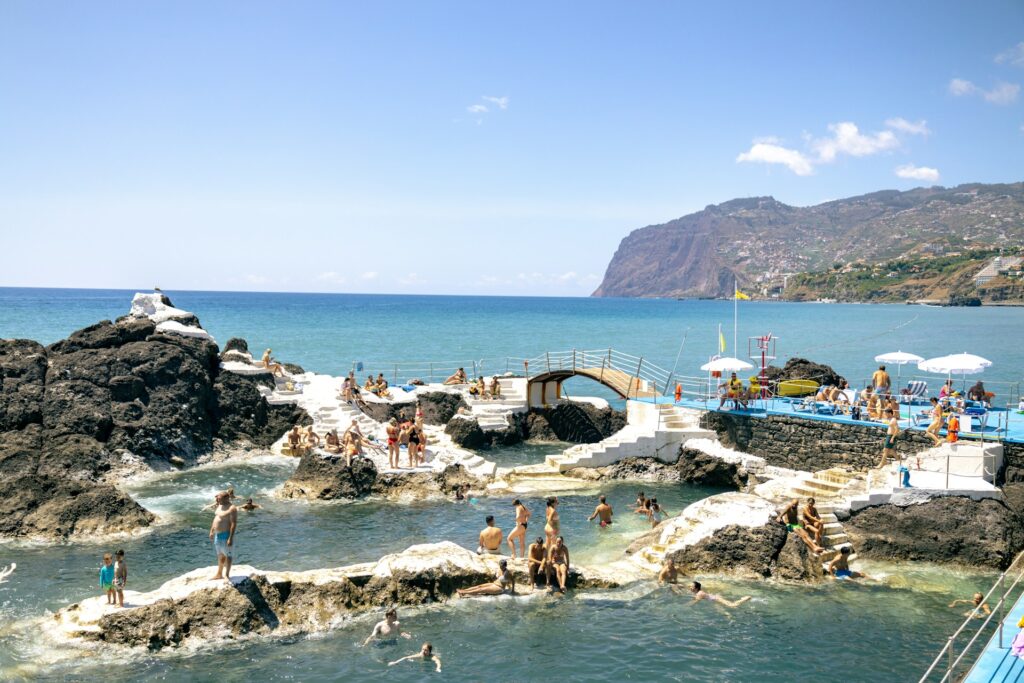
Ribeira Brava
Ribeira Brava is another excellent area for expats seeking a quieter lifestyle while still having access to modern amenities.
Located between the mountains and the sea, Ribeira Brava offers a unique blend of coastal and mountain living. The town has a beautiful promenade along the waterfront, perfect for strolls.
While smaller than Funchal, Ribeira Brava has essential amenities, including shops, restaurants, and healthcare services. This makes it convenient for expats living in Madeira Island, Portugal, who prefer a quieter life without sacrificing accessibility.
The cost of living in Madeira Island, Portugal, is relatively low in Ribeira Brava, making it an ideal choice for retirees and families looking for affordable housing.
The friendly community atmosphere makes it easy for expats living in Madeira Island, Portugal, to feel at home. Local events and gatherings help newcomers integrate and build connections.
Santana
Santana is renowned for its traditional architecture and stunning natural landscapes, making it a unique place for expats.
Living in Santana allows expats to experience Madeira’s rich cultural heritage. The famous thatched roof houses, known as “palheiros,” are a notable attraction and reflect the island’s traditions.
Surrounded by lush mountains and the Laurisilva forest, a UNESCO World Heritage site, Santana is perfect for nature lovers. Expats living in Madeira Island, Portugal, can explore numerous hiking trails and enjoy the breathtaking scenery.
The cost of living in Madeira Island, Portugal, is generally lower in Santana, making it an attractive option for those looking for affordability without compromising on beauty.
The town has a warm and welcoming atmosphere, with various local festivals expats living in Madeira Island, Portugal, can enjoy, providing a sense of belonging.
Where do most expats live in Madeira?
Madeira is Europe’s third most exclusive destination after Marbella in Spain and Positano in Italy.
Most of the time, expats living in Madeira prefer to move to Funchal, the island’s capital. This is because of the urban facilities, vibrant culture, and accessibility of essential services there. Moreover, people also go to Câmara de Lobos because of its charming fishing village and relaxed atmosphere.
The preferences of the expats who plan to live in Madeira, Portugal, vary significantly. While some may prefer a bustling environment, others prefer a calm atmosphere and tranquillity. Key considerations for living in Madeira, Portugal, are the cost of living, amenities, and distance to work.
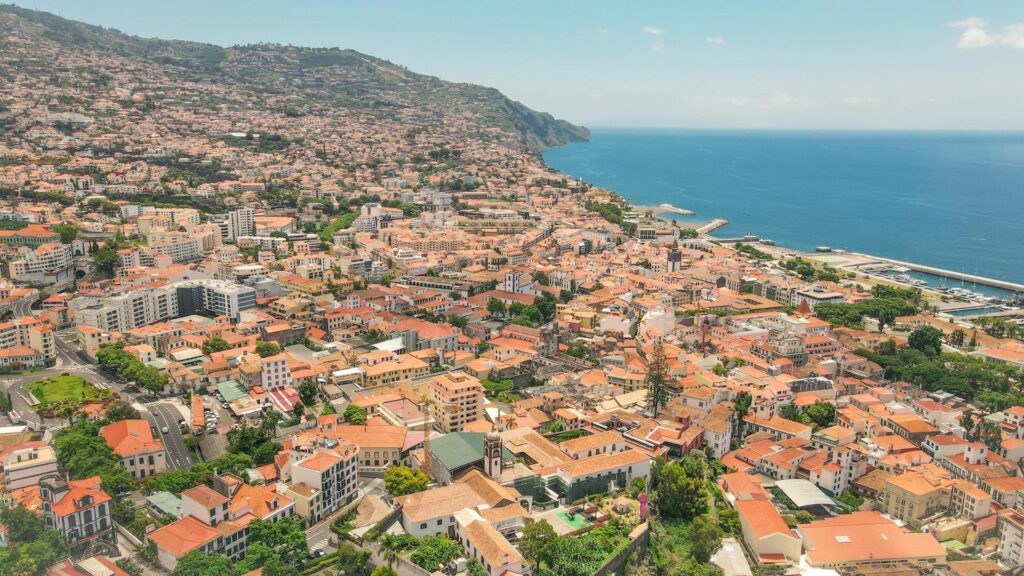
Understanding the Cost of Living in Madeira, Portugal
If you’re considering living in Madeira, Portugal, you might be shocked to learn how affordable the area is. For instance, the estimated average monthly expenses for a family of four are around €2,398, not including rent. Below is a detailed overview of the cost of living in Madeira, covering essential aspects like housing, dining, and utilities.
Property For Sale in Madeira: Property Prices
When looking at property prices, the average price on Madeira Island is approximately €3,173 per square meter, while on Porto Santo, it’s around €2,469.
Renting in Madeira Portugal
If you’re renting, a one-bedroom apartment in the Funchal city centre will cost you about €1,163. However, if you choose to live just outside the centre, the average rent decreases to about €908. For larger families, renting a three-bedroom apartment in the city centre typically costs €1,975, whereas it averages around €1,300 outside the centre.
Dining Out
Dining in Madeira can be delightful without breaking the bank. A budget meal at a local restaurant in Funchal costs about €7, while a three-course dinner for two at a mid-range restaurant is around €50.
For those who appreciate fine dining, Funchal has two Michelin-starred restaurants: Il Gallo d’Oro and William. These offer exceptional cuisine at premium prices.
Utilities
Regarding utilities, the cost for essentials like electricity, heating, cooling, water, and garbage collection averages just over €100 per month for an 85m² apartment.

Madeira Island Portugal: The Advantages And Disadvantages
Expats in Madeira, Portugal
One key gathering place for the expat community is the British Church, which acts as a focal point for social interaction and support among residents.
Unlike many other areas popular with expats, Madeira lacks gated communities, and larger apartment blocks are relatively rare. This unique aspect allows newcomers to immerse themselves in the local culture, fostering authentic connections with the native population.
Living in Madeira means enjoying a rich cultural experience while becoming part of the vibrant community that defines this beautiful island.
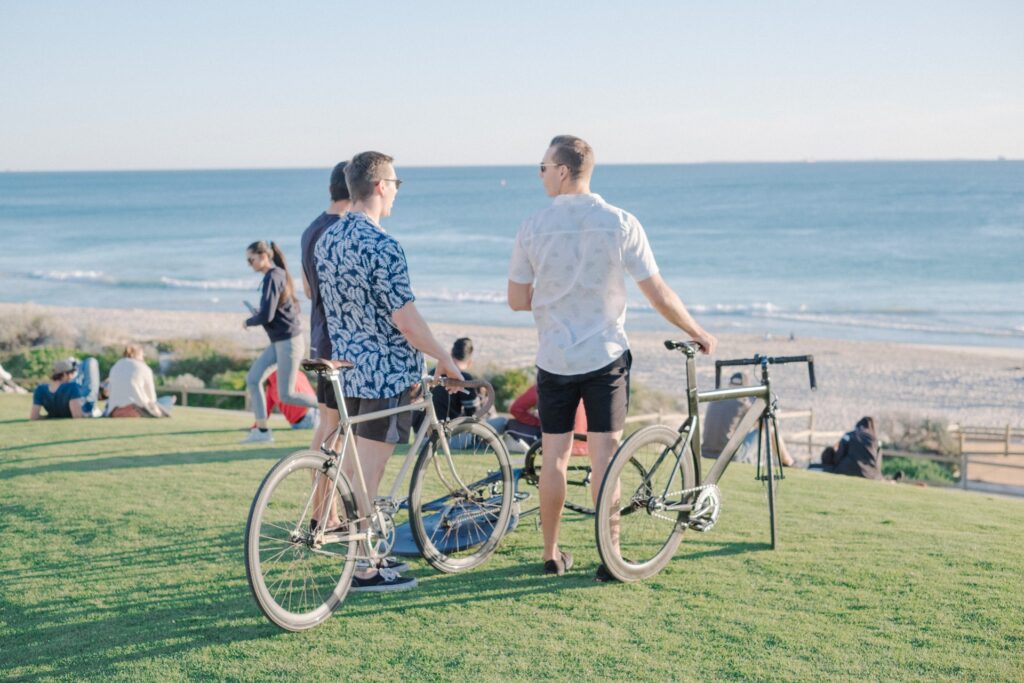
How Can I Move to Madeira, Portugal
Moving to Madeira, Portugal, known for its natural beauty and welcoming community, requires careful planning and understanding of the residency requirements based on your citizenship.
This guide outlines the steps you must take, whether you are an EU/EEA citizen or a non-EU/EEA citizen.
EU/EEA Citizens
As an EU/EEA citizen, relocating to Madeira is relatively straightforward since you do not need a visa to enter Portugal. However, you must obtain your EU Residency Certificate (Certificado de Registo de Cidadão da União Europeia – CRUE). Here’s how to do it:
1. Find Your Local City Hall: After arriving in Madeira, the first step is to locate the City Hall (Câmara Municipal) in your residential area.
2. Gather Required Documents: Prepare the necessary documents for your residency application. Typically, you will need:
- A valid passport or national ID card
- Proof of your address in Madeira (such as a rental contract or utility bill)
- Proof of sufficient financial means to support yourself (like bank statements)
- Health insurance coverage, if applicable
3. Submit Your Application: Once you have all the required documents, visit the City Hall to submit your application for the CRUE. There may be a small fee associated with this process.
4. Receive Your Certificate: Upon approval, you will receive your EU Residency Certificate, which confirms your right to live and work in Madeira.
This process is crucial for ensuring that you have legal residency status in Portugal, opening doors to various benefits, such as healthcare and social services.
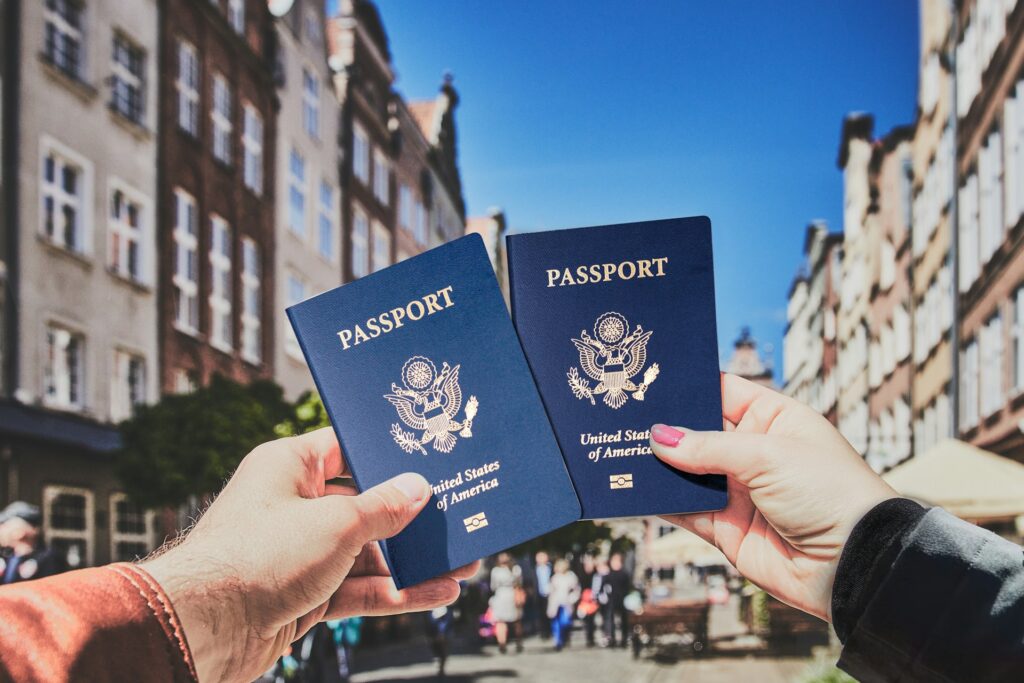
Non-EU/EEA Citizens
For non-EU/EEA citizens, moving to Madeira involves obtaining the appropriate visa before you can reside in Portugal. Here are some popular visa options tailored to different purposes of residence:
Portugal D7 Visa
The D7 Visa is an excellent choice for retirees or passive-income individuals. Here’s what you need to know:
Eligibility: The D7 Visa is designed for those who can demonstrate regular income from pensions, investments, or rental properties. You must prove that you can support yourself without working in Portugal.
Application Process:
- Gather the necessary documentation, including:
- Proof of income (bank statements, pension certificates)
- A valid passport
- A criminal record check from your home country
- Proof of accommodation in Madeira (rental agreement or property ownership)
- You can submit your application at the Portuguese consulate in your home country or directly in Portugal if you are already there.
Benefits: Once granted, the D7 Visa allows you to live in Madeira, enjoy the island’s relaxed lifestyle, and eventually apply for permanent residency.
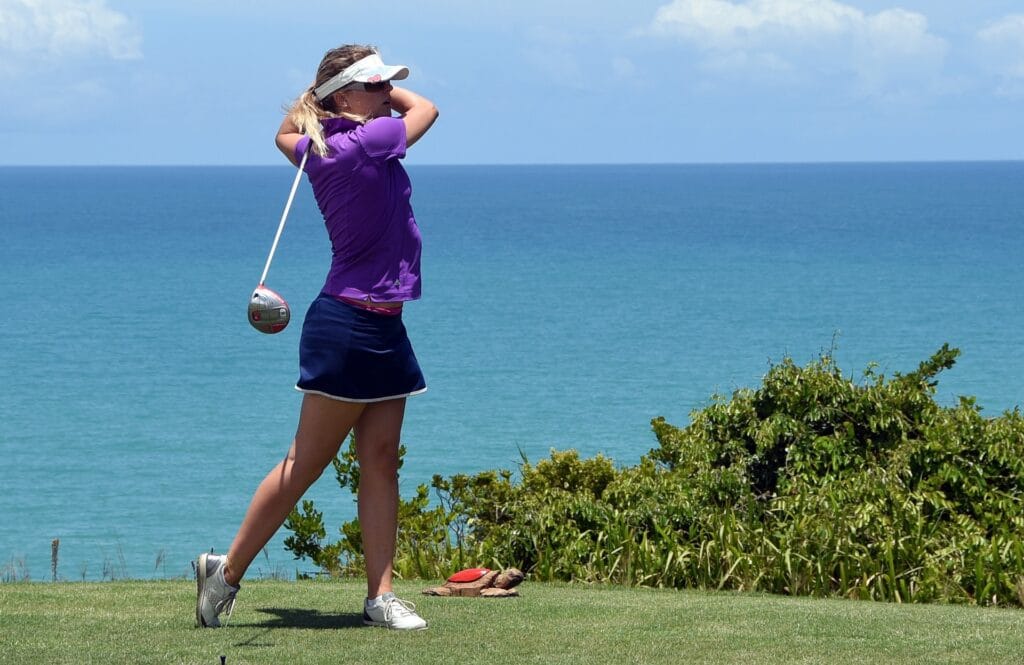
Portugal Digital Nomad Visa
The Digital Nomad Visa caters specifically to remote workers and freelancers. Here’s what to consider:
Purpose: This visa allows you to live and work in Portugal while earning an income from your remote job or business for up to one year.
Requirements:
- Proof of employment or business ownership, demonstrating that your income can be earned remotely.
- Evidence of sufficient funds to support yourself during your stay.
- A valid passport and health insurance coverage.
Application Process:
Similar to the D7 Visa, applications can be submitted at a Portuguese consulate abroad or within Portugal.
Lifestyle Benefits: This visa is perfect for those looking to balance work with the pleasures of living in Madeira. It provides a unique opportunity to experience the island’s beauty and culture while continuing your career.
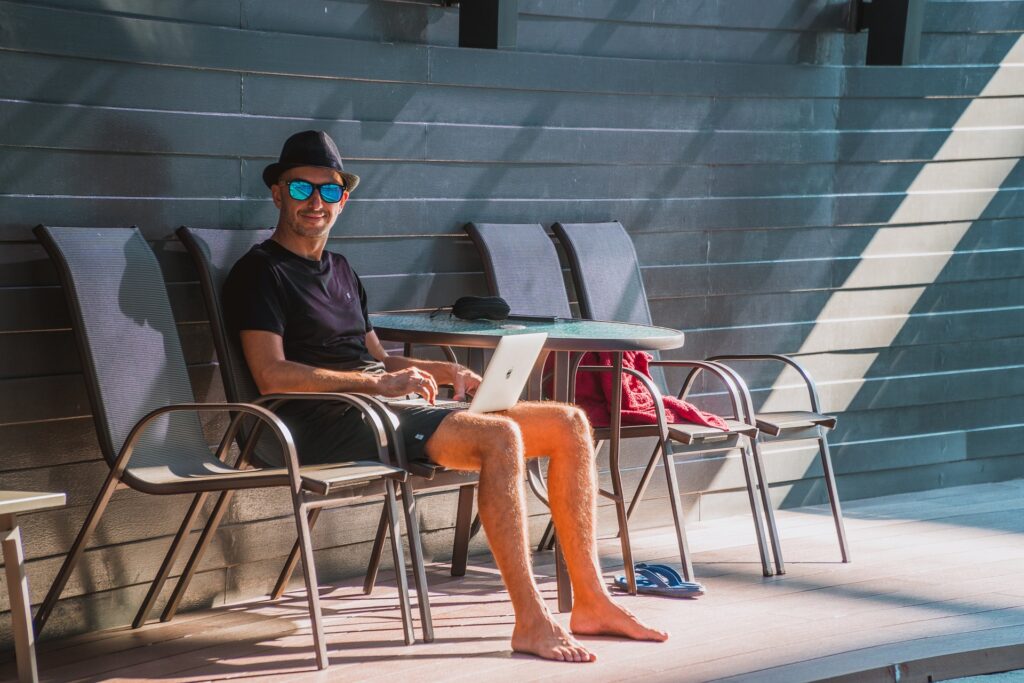
D2 Visa Portugal
The D2 Visa is ideal for entrepreneurs planning to start or expand a business in Portugal:
Eligibility: This visa is for those who intend to invest in a business or create a startup in Portugal.
Requirements:
- A solid business plan outlining your project and its viability.
- Proof of sufficient financial resources to support your business and yourself.
- A valid passport and, if applicable, previous business experience or qualifications.
Application Process:
Similar to the other visas, applications for the D2 Visa can be submitted at the Portuguese consulate in your home country or in Portugal.
Residence Permit: Once granted, the D2 Visa allows you to obtain a residence permit for up to two years, potentially extending it as your business grows.

Find Your Perfect Property with Us
Portugal Investment Properties is your gateway to smart real estate investments in Portugal, offering savvy investors access to an exclusive collection of carefully curated properties.
Whether you’re searching for your dream home or a prime investment opportunity in Portugal’s prestigious market, we provide more than just listings – experience a personalized journey tailored to your aspirations.
Begin your journey to discover your perfect Portuguese retreat. Contact us today!
Looking to Invest in Portugal?
Explore our newest listings below!
Frequently Asked Questions About Living in Madeira Portugal: A Detailed Expat Guide
How easy is it for expats to find work in Madeira?
Finding work in Madeira can vary based on your skills and qualifications, but opportunities are more readily available in sectors like tourism, hospitality, and international business. Expats with expertise in these areas often find it easier to secure positions, making a living in Madeira, Portugal, a viable option.
Are there international schools available in Madeira?
Yes, Madeira offers several international schools that cater to expat families. These institutions provide an education that follows international standards and typically offers classes in English, making it easier for families living in Madeira, Portugal, to transition smoothly.
Why is Madeira a popular destination for expats?
Madeira is known for its stunning natural beauty, pleasant climate, and high quality of life, which attract many expats. The island blends modern amenities with a welcoming local culture, making it an appealing place for those considering living in Madeira, Portugal.
What are some popular areas in Madeira where expats can live?
Popular areas for expats include Funchal, Ponta do Sol, Calheta, Santana, São Martinho, and Ribeira Brava. Each location offers a unique mix of coastal and mountain living options, making it attractive for those living in Madeira, Portugal.
Is Madeira an excellent place to live?
Madeira is widely regarded as an attractive place to live due to its mild subtropical climate, stunning landscapes, and relaxed lifestyle. The island boasts a high quality of life, low crime rates, and affordability, making living in Madeira, Portugal, a desirable option for many.
What types of visas are required for expats to live in Madeira?
Expats from the EU do not require a visa to live in Madeira. Non-EU citizens typically need a residence visa, which can be obtained for work, retirement, or investment purposes. Thus, living in Madeira, Portugal, is accessible for many.
What is the safety and crime rate in Madeira?
Madeira is known for its low crime rate and high level of safety, making it an attractive destination for families and retirees. With violent crime being rare, the friendly environment enhances the appeal of living in Madeira, Portugal.
What are the options for housing and real estate in Madeira?
Madeira offers diverse housing options, from modern apartments in Funchal to charming villas with ocean views. Real estate prices are generally more affordable than hotspots on mainland Portugal, making living in Madeira, Portugal, an attractive choice for homebuyers.
Are there jobs for expats?
While finding a permanent job in Madeira can be challenging, opportunities exist, particularly in sectors like IT, health, and tourism, which often report shortages. Expats considering living in Madeira, Portugal, might also explore seasonal jobs or start their businesses supported by the government.
What is the most expensive part of Madeira?
Funchal is the most expensive area on the island to buy property in, primarily due to its high demand and abundance of services. However, for those living in Madeira, Portugal, investing in property in Funchal can be worthwhile, given its vibrant community and amenities.
